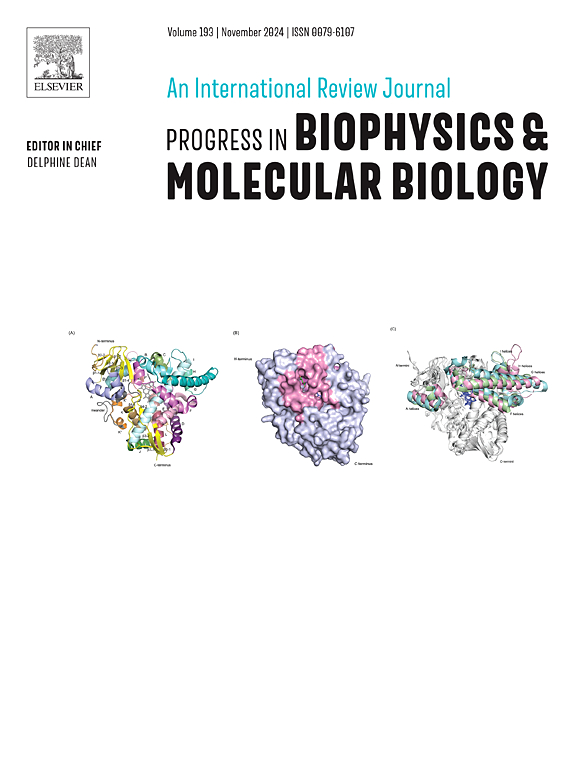Advancing targeted therapies in pancreatic cancer: Leveraging molecular abberrations for therapeutic success
IF 4.5
3区 生物学
Q2 BIOCHEMISTRY & MOLECULAR BIOLOGY
Progress in Biophysics & Molecular Biology
Pub Date : 2025-02-21
DOI:10.1016/j.pbiomolbio.2025.02.003
引用次数: 0
Abstract
Pancreatic cancer is one of the most deadly with poor prognosis and overall survival rate due to the dense stroma in the tumors which often is challenging for the delivery of drug to penetrate deep inside the tumor bed and usually results in the progression of cancer. The conventional treatment such as chemotherapy, radiotherapy or surgery shows a minimal benefit in the survival due to the drug resistance, poor penetration, less radiosensitivity or recurrence of tumor. There is an urgent demand to develop molecular-level targeted therapies to achieve therapeutic efficacy in the pancreatic ductal adenocarcinoma (PDAC) patients. The precision oncology focuses on the unique attributes of the patient such as epigenome, proteome, genome, microbiome, lifestyle and diet habits which contributes to promote oncogenesis. The targeted therapy helps to target the mutated proteins responsible for controlling growth, division and metastasis of tumor in the cancer cells. It is very important to consider all the attributes of the patient to provide the suitable personalized treatment to avoid any severe side effects. In this review, we have laid emphasis on the precision medicine; the utmost priority is to improve the survival of cancer patients by targeting molecular mutations through transmembrane proteins, inhibitors, signaling pathways, immunotherapy, gene therapy or the use of nanocarriers for the delivery at the tumor site. It will become beneficial therapeutic window to be considered for the advanced stage pancreatic cancer patients to prolong their survival rate.
推进胰腺癌靶向治疗:利用分子畸变获得治疗成功。
胰腺癌是最致命的肿瘤之一,由于肿瘤间质致密,药物难以渗透到肿瘤床的深处,往往导致癌症的进展,预后和总生存率都很差。由于耐药、穿透性差、放射敏感性低或肿瘤复发,化疗、放疗或手术等传统治疗方法对生存的益处很小。为了提高胰腺导管腺癌(PDAC)患者的治疗效果,迫切需要开发分子水平的靶向治疗方法。精准肿瘤学关注患者的独特属性,如表观基因组、蛋白质组、基因组、微生物组、生活方式和饮食习惯,这些都有助于促进肿瘤的发生。靶向治疗有助于靶向癌细胞中负责控制肿瘤生长、分裂和转移的突变蛋白。考虑患者的所有属性以提供合适的个性化治疗以避免任何严重的副作用是非常重要的。在这篇综述中,我们重点介绍了精准医疗;当务之急是通过跨膜蛋白、抑制剂、信号通路、免疫治疗、基因治疗或使用纳米载体在肿瘤部位递送靶向分子突变,提高癌症患者的生存率。这将成为晚期胰腺癌患者延长生存率值得考虑的有益治疗窗口。
本文章由计算机程序翻译,如有差异,请以英文原文为准。
求助全文
约1分钟内获得全文
求助全文
来源期刊

Progress in Biophysics & Molecular Biology
生物-生化与分子生物学
CiteScore
8.60
自引率
7.90%
发文量
85
审稿时长
85 days
期刊介绍:
Progress in Biophysics & Molecular Biology is an international review journal and covers the ground between the physical and biological sciences since its launch in 1950. It indicates to the physicist the great variety of unsolved problems awaiting attention in biology and medicine. The biologist and biochemist will find that this journal presents new and stimulating ideas and novel approaches to studying and influencing structural and functional properties of the living organism. This journal will be of particular interest to biophysicists, biologists, biochemists, cell physiologists, systems biologists, and molecular biologists.
 求助内容:
求助内容: 应助结果提醒方式:
应助结果提醒方式:


